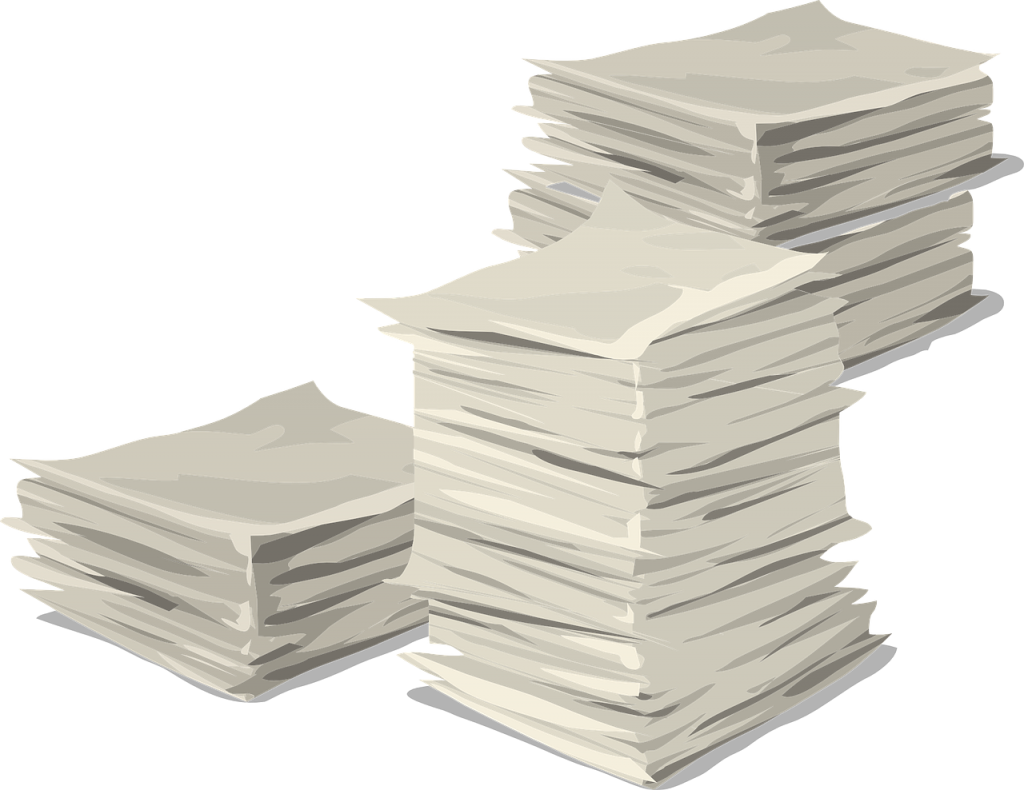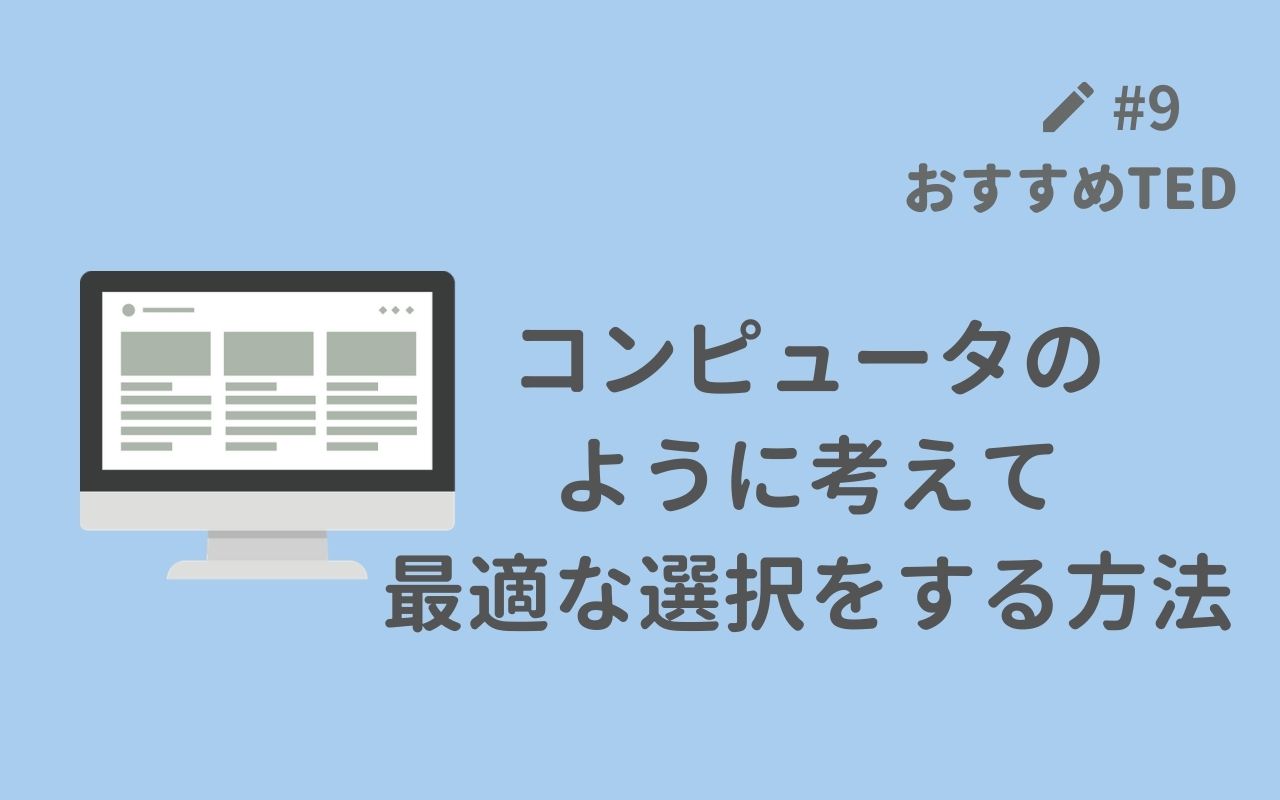こんにちは、ricaです。
TED talks を300コンテンツ以上視聴してきた私が、おすすめの TED talks を解説付きで紹介します。
Talkの内容を要約しながら英単語やフレーズなどピックアップしています。
英語学習にも、日々の学びにもお役立ていただけると思いますので是非ご覧ください♩
*********
今日は、何かを選択する時や決断をしなければならない時のライフハックについてです。
今夜のレストラン探しから、家探しや結婚相手、転職先探しまで、私たちは無限とも言える選択肢の中から決めていかなければいけません。
「どうすれば納得感のある選択ができるのか?」「どれくらいの選択肢を検討するのが十分なのか?」
誰もが悩んだことがあると思います。
スピーカーのトム・グリフィスさんは、コンピュータのようにロジカルに考えることで合理的で効率的な物事の選択ができると言います。
*********
3 ways to make better decisions — by thinking like a computer
コンピューターのように考えることで良い決断をする3つの方法
Tom Griffiths
トム・グリフィス
11:47
| 話すスピードの速さ | ★★★☆☆ |
| 動画の長さ | ★★★☆☆ |
| 語彙の難しさ | ★★★☆☆ |
| アクセントの難しさ | ★★☆☆☆ |
| 笑いどころの多さ | ★★☆☆☆ |
引越し先物件の効率的な決め方

このtalkはシドニーでの家探しのお話から始まります。
Every time you walk into an open house, you get some information about what’s out there and what’s on the market, but every time you walk out, you’re running the risk of the very best place passing you by.
TED公式サイトより引用
売り出し中の家に 足を踏み入れれば どんな物件があるのか 情報が得られますが 立ち去るときには 最高の掘り出し物を 逃してしまうリスクがあります
https://www.ted.com/talks/tom_griffiths_3_ways_to_make_better_decisions_by_thinking_like_a_computer/transcript
what’s out there:世に存在する〜
out there自体には「あちらに」とか「向こうに」の意味もあります。
the very:まさしく、まさに

皆さんは引越しの時に物件をどれくらい見に行きますか?
何件くらい見れば理想の物件に辿り着けるものなのか、知りたいですよね。
悪くないけど、他のも見てみたい、、と思っているうちに、他の人が先に契約してしまったり。
This is such a cruel and familiar problem that it might come as a surprise that it has a simple solution. 37 percent.
TED公式サイトより引用
これはとても無情かつ よくある問題なので 簡単な答えがあると言ったら 驚くかもしれません 37%です
https://www.ted.com/talks/tom_griffiths_3_ways_to_make_better_decisions_by_thinking_like_a_computer/transcript
cruel:残酷な

赤色マーカーのsuch…that~を見てください。これは、おなじみso that構文とよく似ている表現です。
意味はso that構文と同じ。such…that~で、”とても…なので~である”と訳します。
so that構文との違いは、文法です。
so that構文は、so 形 a 名 that ですが、such that構文は、such a 形 名 となります。
ricaは、こういう細かい文法は特に覚えようとせず、聴いたり読んだりした時に意味がわかれば良いかなと思うようにしています♩(笑)

で、37%とは、一体どういうことなんでしょう。
If you want to maximize the probability that you find the very best place, you should look at 37 percent of what’s on the market, and then make an offer on the next place you see, which is better than anything that you’ve seen so far.
Or if you’re looking for a month, take 37 percent of that time — 11 days, to set a standard — and then you’re ready to act.最高のものを見付けられる 可能性を最大化したければ 出ている物件の 37%を見て 次に出会った これまでで一番良いやつに 決めればいいんです
TED公式サイトより引用
1ヶ月で探すなら 37%の時間— 11日間で基準を決め 行動に移る準備をします
https://www.ted.com/talks/tom_griffiths_3_ways_to_make_better_decisions_by_thinking_like_a_computer/transcript
set a standard:基準を設定する

なるほど。
引越し先を決める場合は、11日間で決めるならまだ現実的だし、エリアや予算で機械的にある程度絞った上で、37%を見るのもいいなって思いました。
(20件に絞ったら7.4件見にいくとかね)

ここで気になるのが、37%の根拠は?
We know this because trying to find a place to live is an example of an optimal stopping problem.
TED公式サイトより引用
A class of problems that has been studied extensively by mathematicians and computer scientists.
なぜそう言えるかというと 家を探すというのは 「最適停止問題」の一例だからで
これは数学者や コンピューター科学者によって よく研究されている 問題なんです
https://www.ted.com/talks/tom_griffiths_3_ways_to_make_better_decisions_by_thinking_like_a_computer/transcript
A class of 〜:〜の類
extensively:広く、広範囲にわたって

最適停止問題とはなんぞや?と思い調べてみました。
「(期待報酬を最大化したり期待コストを最小化するために)特定の行動をとる最適なタイミング(時期や時刻)を選択決定する数学の問題」だそうです。(wikipediaから引用させてもらいました)
一定回数まではNoと言い続け、あるタイミングで、これまでのものと比較して良いと感じればそこで決定、まだダメなら次の選択肢にうつる、というやり方でおこなうのだそうです。
全体のn数が大きくなるほど、決定される確率が37%に近づいていくとのこと。
人生に悩んだらコンピュータサイエンティストに相談せよ?

スピーカーであるトムさんはコンピュータサイエンティストで、日々、日常に現れる問題の最適解と私たち人間が実際にしている行動を比較しているそうです。
そして、コンピュータ科学を適用すれば人間の意思決定が楽にできる、ということに気がついていったそうです。
Growing up in Perth as an overly cerebral kid …
TED公式サイトより引用
I would always try and act in the way that I thought was rational, reasoning through every decision, trying to figure out the very best action to take.
頭でっかちな子供として パースで育った私は—
常に合理的と思える 方法を求め あらゆる決定を論理的にし 取るべき最善の行動を 見出そうとしていました
https://www.ted.com/talks/tom_griffiths_3_ways_to_make_better_decisions_by_thinking_like_a_computer/transcript
cerebral:大脳の、知的な

生粋の理系男子ですね(笑)
ちなみにパースは西オーストラリアの都市です。


常に合理的に!論理的に!と行動するのって、実際難しいんですよね。
トムさんもやはり同様で、常にロジカルでありたいがために彼女と別れようと思ったことさえあるそうです(笑)
She pointed out that I was taking the wrong approach to solving this problem —
TED公式サイトより引用
and she later became my wife.
私はこの問題に 間違ったアプローチをしていると 彼女は指摘したものです
その子は後に 私の妻になりました
https://www.ted.com/talks/tom_griffiths_3_ways_to_make_better_decisions_by_thinking_like_a_computer/transcript

突然のノロケ!(笑)良い話♡
Whether it’s as basic as trying to decide what restaurant to go to or as important as trying to decide who to spend the rest of your life with, human lives are filled with computational problems that are just too hard to solve by applying sheer effort.
どのレストランに行くか決めるという 簡単な問題から 残りの人生を共に歩む相手を決めるという 重大な問題まで 人生は 計算論的な問題に 満ちていて 単に根性で解決しようとするには 難しすぎます
TED公式サイトより引用
https://www.ted.com/talks/tom_griffiths_3_ways_to_make_better_decisions_by_thinking_like_a_computer/transcript
sheer:(生地などが)透けるほどとても薄い、まったくの、険しい
意味がたくさんあっていまいち覚えづらい単語ですね。。他のtalkにも品パインに出てくる単語なので、無理やり暗記するより色々な文章で出会って覚えていきましょう。

赤色マーカーのWhether…or~を見てください。
Whetherは〜かどうか、と習ってきたかと思いますが、このように使われる時にはWhether A or BでAであろうとBであろうと、の意味になります。
When you’re looking for life advice, computer scientists probably aren’t the first people you think to talk to. Living life like a computer — stereotypically deterministic, exhaustive and exact — doesn’t sound like a lot of fun.
人生のアドバイスがほしいとき コンピューター科学者というのは 最初に思い付く相手ではないでしょう コンピューターみたいに 暮らしていて ステレオタイプとしては 正確 網羅的で 時計仕掛けのようで 楽しそうでありません
TED公式サイトより引用
https://www.ted.com/talks/tom_griffiths_3_ways_to_make_better_decisions_by_thinking_like_a_computer/transcript
exhaustive:網羅的な、徹底的な
But thinking about the computer science of human decisions reveals that in fact, we’ve got this backwards.
しかし人間の意思決定を コンピューター科学で考えると 逆であることが分かります
TED公式サイトより引用
https://www.ted.com/talks/tom_griffiths_3_ways_to_make_better_decisions_by_thinking_like_a_computer/transcript
reveal:明らかにする

実際、人間の生活の中で現れる難しい問題に対しては、コンピュータは人間の行動とよく似た方法で問題を解くのだそうです。
今晩のレストランの決め方

どのレストランで食事をするか決めるとします。
レストラン選びは、複数の選択肢の中から一つを選び、明日もまた同じ問題に直面する、というシチュエーションですね。
コンピュータサイエンティストは、この状況を「探索と活用のトレードオフ」と呼ぶそうです。
In that situation, you run up against what computer scientists call the “explore-exploit trade-off.”
この状況では 「探索と活用のトレードオフ」と コンピューター科学者が呼ぶものが生じます
TED公式サイトより引用
https://www.ted.com/talks/tom_griffiths_3_ways_to_make_better_decisions_by_thinking_like_a_computer/transcript
run up against:〜と衝突する、出くわす
exploit:利用する、悪用する、搾取する
You have to make a decision about whether you’re going to try something new — exploring, gathering some information that you might be able to use in the future — or whether you’re going to go to a place that you already know is pretty good — exploiting the information that you’ve already gathered so far.
ある決断を しなければなりません 何か新しいものを試し 将来使える情報を 集めるために 「探索」をするか あるいは 結構良いと 既に分かっているところに行き これまでに集めた情報を 「活用」するか
TED公式サイトより引用
https://www.ted.com/talks/tom_griffiths_3_ways_to_make_better_decisions_by_thinking_like_a_computer/transcript

そしてこの状況は、音楽を聴く時でも、誰と過ごすか決める時でも、ウェブサイトに出す広告をテクノロジー企業が決める時にも当てはまるシチュエーションだとトムさんは言います。

これまでコンピュータサイエンティストたちは60年にわたりこの問題に向き合い、インサイトが得られたそうです。レストランの例で説明してくれます。
When you’re trying to decide what restaurant to go to, the first question you should ask yourself is how much longer you’re going to be in town.
If you’re just going to be there for a short time, then you should exploit.
There’s no point gathering information. Just go to a place you already know is good.
But if you’re going to be there for a longer time, explore.
Try something new, because the information you get is something that can improve your choices in the future. The value of information increases the more opportunities you’re going to have to use it.どのレストランに行くか 決めようとするとき 最初に問うべきことは その街に あとどれくらい いるのかということです
TED公式サイトより引用
そこに短期間しかいないなら 活用を選ぶべきです
情報を集めても しょうがないので 良いと分かっているところに 行けばいい
でも長くいることになるのであれば 探索しましょう
新しいことを試し 得られた情報で 将来より良い選択が できるでしょう 情報の価値は その情報を使う機会が 多いほど大きくなります
https://www.ted.com/talks/tom_griffiths_3_ways_to_make_better_decisions_by_thinking_like_a_computer/transcript

この原理は人間の一生の流れについても同じことが言えるそうです。
赤ちゃんはなんでも口に入れてみて、そのうち美味しいと思うものに出会える。
一方、お年寄りだと、いつも同じお店、同じメニューの人を頼む人がいる。
この人は、長い人生の経験を通して得た知識を活用している、と言います。
More generally, knowing about the explore/exploit trade-off can make it a little easier for you to sort of relax and go easier on yourself when you’re trying to make a decision.
You don’t have to go to the best restaurant every night.
Take a chance, try something new, explore. You might learn something. And the information that you gain is going to be worth more than one pretty good dinner.一般に 探索と活用のトレードオフを 理解していると 何か決断するときに 自分に寛容になれて 気が楽になります
TED公式サイトより引用
毎晩最高のレストランに 行く必要はありません
思い切って何か新しいものを試し 探索すればいい 何か学べるかもしれません そうやって得られた情報は 1度のおいしい晩ご飯よりも 価値があるでしょう
https://www.ted.com/talks/tom_griffiths_3_ways_to_make_better_decisions_by_thinking_like_a_computer/transcript

この考え方、すごくイイなって思いました。
私、どのお店でご飯を食べるか、めちゃくちゃ悩むんですよ。
たまにハズしてもいいから、冒険してみよう、って気持ちでラフに決めていくと、ストレスがなくていいな、と思います。
使用頻度で整理せよ

そして、このコンピュータ科学というものは、家庭や仕事場でも役に立つといいます。
If you’ve ever had to tidy up your wardrobe, you’ve run into a particularly agonizing decision: you have to decide what things you’re going to keep and what things you’re going to give away.
衣類を整理しなければ ならなくて 難しい決断を迫られたことが あるかもしれません どれを取っておき どれを手放すか 決めなければなりません
TED公式サイトより引用
https://www.ted.com/talks/tom_griffiths_3_ways_to_make_better_decisions_by_thinking_like_a_computer/transcript
tidy up:片付ける
agonize:苦しむ、悶える

ここでマーサ・スチュワートさんの話がでます。
彼女はアメリカの元祖カリスマ主婦的存在の実業家で、書籍などが多数出版されています。
彼女が提唱するお片付けのコツは、以下の4つの質問を自問することなんだそう。

- どれくらいの期間、所持しているか?
- まだちゃんと使えるか?
- 重複して持っているものはないか?
- 最後に使ったのはいつか?

私はこんまり先生信者なので、5として、Does it spark joy?(ときめくか?)も入れたいw
そして、この問題について更に熱心に研究している人たちがいるそうです。誰でしょうか。
The people who design the memory systems of computers.
コンピューターの記憶システムの 設計者です
TED公式サイトより引用
https://www.ted.com/talks/tom_griffiths_3_ways_to_make_better_decisions_by_thinking_like_a_computer/transcript

トムさんによると、コンピュータの記憶システムは高速・高価・低容量なものと、大容量・低速なものの2種類に分類されます。
効率よくコンピュータを動かすためにどのデータを高速な記憶システムに入れるか、設計者は決めなくてはいけません。
そこで、先ほどのマーサ・スチュワートの教えの4つ目の考え方が適用されています。頻繁に使うデータが高速の方に入っているんですね。
Recognizing that, maybe it’s worth applying the least recently used principle to organizing your wardrobe as well.
そうであれば 衣装ダンスの整理にも この「最長未使用原則」を 適用すると良いかもしれません
TED公式サイトより引用
https://www.ted.com/talks/tom_griffiths_3_ways_to_make_better_decisions_by_thinking_like_a_computer/transcript

この整理術は、オフィスでも使えると言います。
The Japanese economist Yukio Noguchi actually invented a filing system that has exactly this property.
He started with a cardboard box, and he put his documents into the box from the left-hand side.Each time he’d add a document, he’d move what was in there along and he’d add that document to the left-hand side of the box. And each time he accessed a document, he’d take it out, consult it and put it back in on the left-hand side.日本の経済学者の 野口悠紀雄は まさにこの性質を持つ 書類整理法を考案しました 段ボール箱を使い 書類を箱の左端に入れます 書類を追加するときには 元からあるものを 右にずらして 左端に入れます 書類を使うときは 箱から取り出し 使った後は 箱の左端に戻します
TED公式サイトより引用
https://www.ted.com/talks/tom_griffiths_3_ways_to_make_better_decisions_by_thinking_like_a_computer/transcript
cardboard:段ボール

突然日本の経済学者野口先生の話がでてきて少しびっくりしました(笑)
使う度に必ず左側に戻すようにすると、使いたい資料を探す時に左から右に見ていけば良い、という整理整頓術だそうです。
でもこれってすでに実践できちゃっている人いませんか?👇のように縦横が逆の状態で。


実はトムさんも同じことを言っていて(笑)
Before you dash home and implement this filing system —
it’s worth recognizing that you probably already have.
That pile of papers on your desk … typically maligned as messy and disorganized, a pile of papers is, in fact, perfectly organized —家へと急ぎ戻って この書類システムを作ろうとする前に—
TED公式サイトより引用
たぶん皆さんはこれを既に お持ちであることを指摘しておきます
机の上の書類の山です 乱雑で整理されていないと 言われがちですが 書類の山というのは 実は完璧に整理されているのです
https://www.ted.com/talks/tom_griffiths_3_ways_to_make_better_decisions_by_thinking_like_a_computer/transcript
malign:悪口を言う、中傷する
同じスペルで形容詞の意味もあります。(有害な、悪意のある)

でもこれじゃやっぱり見た目が良くないし取り出しづらいですよね(笑)
効率良く効果を最大化しよう
Organizing your wardrobe or your desk are probably not the most pressing problems in your life.
TED公式サイトより引用
衣装ダンスや机を 整理するというのは 皆さんにとって人生で最も 切迫した問題ではないでしょう
https://www.ted.com/talks/tom_griffiths_3_ways_to_make_better_decisions_by_thinking_like_a_computer/transcript
pressing:差し迫った、急を要する

私たち人間が解決しなければならない問題というのは、複雑で難しいことも多いだろうとトムさんは言います。
But even in those cases, computer science can offer some strategies and perhaps some solace.
そういう場合でも コンピューター科学は そういう場合でも コンピューター科学は 何らかの戦略や慰めを 提供できます
solace:慰め
The best algorithms are about doing what makes the most sense in the least amount of time. When computers face hard problems, they deal with them by making them into simpler problems — by making use of randomness, by removing constraints or by allowing approximations. Solving those simpler problems can give you insight into the harder problems, and sometimes produces pretty good solutions in their own right.
最高のアルゴリズムというのは 最も意味あることを 最小限の時間で行うものです コンピューターは 困難な問題に直面したとき 問題を簡単化することで対処します ランダム性を取り入れるとか 制約を取り除くとか 近似値で済ますとか 簡単化した問題は 困難な問題に対する ヒントを与え それ自体が結構良い 解決法になっていることもあります
TED公式サイトより引用
https://www.ted.com/talks/tom_griffiths_3_ways_to_make_better_decisions_by_thinking_like_a_computer/transcript
make the most sense:最も筋が通っている
constraint:制約、制限
approximation:近似

さて、冒頭に家探しの37%ルールの話がありましたが、この最適化戦略を持ってしても、必ずしも完璧な結果が得られるわけではありません。
では、37%ルールに従って決断した時に、最善の結果が得られる確率は?
If you follow the 37 percent rule, the probability that you find the very best place is — funnily enough ..37 percent. You fail most of the time. But that’s the best that you can do.
37%の法則に従うとき 一番良いものを 引き当てられる確率は 奇遇にも—
TED公式サイトより引用
37%です 多くの場合に 失敗しますが それが皆さんにできる 最善のことなんです
https://www.ted.com/talks/tom_griffiths_3_ways_to_make_better_decisions_by_thinking_like_a_computer/transcript
most of the time:ほとんどの場合

なんという偶然!そして、頑張っても37%が限界という無情さ・・・。
でも、トムさんはこの結果についてとても前向きなコメントで締め括ります。
Ultimately, computer science can help to make us more forgiving of our own limitations.
You can’t control outcomes, just processes.
And as long as you’ve used the best process, you’ve done the best that you can. Sometimes those best processes involve taking a chance —
not considering all of your options, or being willing to settle for a pretty good solution. These aren’t the concessions that we make when we can’t be rational —
they’re what being rational means.コンピューター科学は 自分の限界に寛容になれるよう 助けてくれるんです
TED公式サイトより引用
結果を制御はできず 制御できるのはプロセスだけです
最高のプロセスを使っているなら 最善を尽くしたと言えるのです
最高のプロセスが 賭けを含むこともあります
すべての選択肢を考慮しないで かなり良い答えで 手を打つということです
これは合理的にやれないときにする 妥協というわけではなく
これこそが合理的ということの 意味なのです
https://www.ted.com/talks/tom_griffiths_3_ways_to_make_better_decisions_by_thinking_like_a_computer/transcript
take a chance:一か八かやってみる
concession:譲歩、許容
*********
いかがでしたか?
膨大な選択肢の中から何かを決めなくてはいけない時、自分が本当に正しい選択をできているかどうか、ストレスがたまることがあります。
でも、37%ルールを適用して、「私は最善を尽くしたんだ!」と思うことで、心の満足度を上げていきたいなと思いました。
あとは、クローゼットの整理もやろうと思います。
それでは、また次回♡




コメント